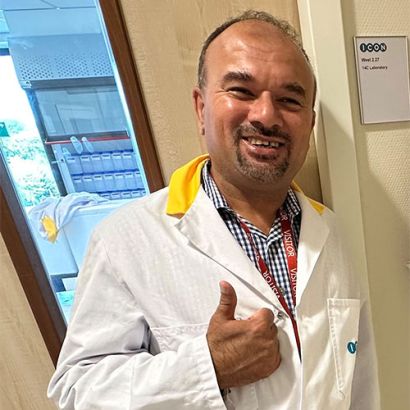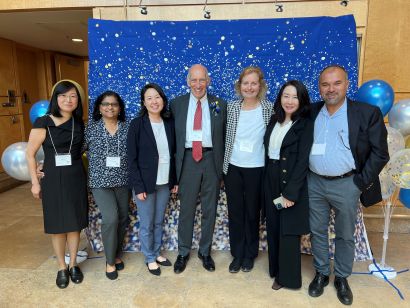- About
- Organization
- Organization Overview
- Dean’s Office
- Department of Bioengineering and Therapeutic Sciences
- Department of Clinical Pharmacy
- Department of Pharmaceutical Chemistry
- Quantitative Biosciences Institute
- Org Chart
- Research
- Education
- Patient Care
- People
- News
- Events
Navigating the Pipeline: Alum Drives Drug Development at Eli Lilly
By Suzan Revah / Mon Jun 16, 2025

When Muhammad Baluom, PhD, arrived at the UCSF School of Pharmacy in 2000 as a postdoctoral scholar, he had already earned his BPharm and PhD from the Hebrew University of Jerusalem. But it wasn’t until he joined the lab of Department of Bioengineering and Therapeutic Sciences Professor Leslie Benet, PhD, ‘65, that he began to realize the trajectory of his path in drug development.
“A few months after I joined, I met several of Professor Benet’s former students — some were leaders at major pharmaceutical companies, others were academic leaders,” he said. “That’s when I realized: If these are all his students, and I’m now one of them, I must be on a path toward something meaningful, too.”
At UCSF, Baluom studied drug-drug interactions involving HIV protease inhibitors and immunosuppressants for organ transplant HIV patients, pioneering work in infectious disease and pharmacokinetics. Today, he is an executive director of clinical pharmacology at Eli Lilly and Company, helping to guide life-saving drug development from early discovery through late-stage trials.
“We had the opportunity to follow HIV patients who underwent transplants, tracking how the medications behaved and interact with each other, leading to adjusting doses accordingly,” he said. “It was fascinating and practical research.”
From dispensing to making pharmaceuticals
Baluom said he was first inspired to become a drug developer after working as a pharmacist. “Instead of selling drugs, I thought: What if I could get involved in the research and make them?” he said.
After completing his postdoctoral training at UCSF, Baluom was hired by UCSF alum David Lau, BS, PhD ‘91, at a small company called Rigel, where he stayed for over a decade. He later transitioned to roles leading clinical pharmacology teams at various biotech companies before joining Dice Therapeutics, which focused on developing an oral medication to treat autoimmune diseases such as plaque psoriasis.
“Dice was a small company doing big science,” Baluom said. “They were looking to see if using an IL-17 inhibitor could help with treating plaque psoriasis, and 11 months after I joined, Eli Lilly acquired the company for $2.4 billion.”
Following the acquisition in June 2023, Baluom and his colleagues were retained by Eli Lilly. “Lilly valued the scientists and the science coming out of Dice,” he said.
Baluom has led the clinical pharmacology programs behind several investigational and approved therapies for oncology, immunology, and pain management.
“About 70% of what you see in a drug label comes from clinical pharmacology,” Baluom said. “We study how drugs behave — how they’re absorbed, metabolized, and how different factors like age or diet affect them. That’s critical to getting the right dose and maximizing safety.”
Connecting the dots between science and patient care
A combination of scientific rigor, teamwork, and perseverance helped Baluom and his team evolve from smaller companies to Eli Lilly. “At the end of the day, it's all the same basic science and the same basic deliverables,” he said. “When you work with a smaller company, everyone wears multiple hats. At a larger company, where you have all the resources, you are more focused on your specific function.”

Baluom (far right) reconnecting with colleagues at a celebration honoring Department of Bioengineering and Therapeutic Sciences Professor Leslie Benet, PhD, ‘65 (center).
While clinical pharmacology may be an unsung hero in the drug development process, Baluom said he has gained a deep appreciation for how it connects the dots between science and patient care — against long odds, given that less than 1 percent of compounds makes it from discovery to market.
“There are a lot of steps that can affect drug development and whether a drug reaches the patient, and you always need to collaborate,” he said, noting the important roles of physicians, nurses, patients, and regulatory agencies in the journey to drug discovery and approval. “Clinical pharmacologists are getting more recognition for the important role they play in translating data into decisions that impact real lives.”
Tags
About the School: The UCSF School of Pharmacy aims to solve the most pressing health care problems and strives to ensure that each patient receives the safest, most effective treatments. Our discoveries seed the development of novel therapies, and our researchers consistently lead the nation in NIH funding. The School’s doctor of pharmacy (PharmD) degree program, with its unique emphasis on scientific thinking, prepares students to be critical thinkers and leaders in their field.




